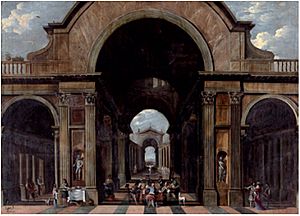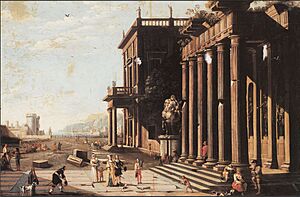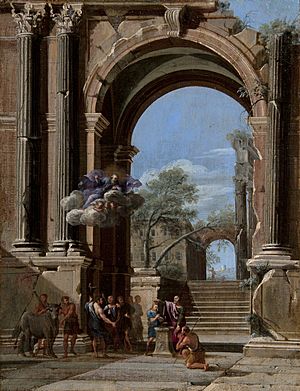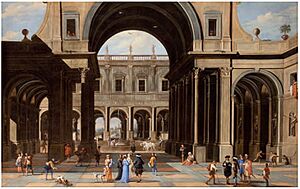Vicente Giner facts for kids
Vicente Giner was a Spanish painter who lived from about 1636 to 1681. He was also a priest. Vicente was known for painting amazing pictures of buildings, both real and imaginary. He often worked with another famous painter named Viviano Codazzi in Rome, Italy.
About Vicente Giner's Life
Vicente Giner was born around 1636 in a town called Castéllon de la Plana, close to Valencia, Spain. He learned to paint there and also became a Catholic priest.
By May 1672, Vicente Giner was living in Rome. He gave his nephew, José Giner, permission to sell any of his belongings back in Spain. This shows that Vicente had already left Spain and needed someone to manage his things there. At this time, he lived in a part of Rome called Campo Marzio.
Giner worked closely with Viviano Codazzi, a well-known painter of buildings. Codazzi had moved to Rome in 1648. Vicente Giner might have painted the people in Codazzi's building pictures. He also painted figures for Codazzi's son, Niccolò Codazzi, when Niccolò worked in his father's art studio. One example of their teamwork is the painting Saint Peter Baptizing the centurion and the Arch of Titus.
In 1680, Giner lived on Via Gregoriana in Rome. That year, he and another artist, Sebastián Muñoz, signed a letter. They sent it to Gaspar Méndez de Haro, 7th Marquis of Carpio, who was the Spanish Ambassador in Rome. The artists asked for a new art school for Spanish artists in Rome, like the French one. They wanted the famous painter Francisco Herrera the Younger to lead it. The Ambassador, who loved art, liked the idea. However, the Spanish King said no because there wasn't enough money at that time.
Vicente Giner passed away on September 5, 1681. He was buried in a nearby church called Sant Andrea delle Fratte.
Vicente Giner's Artworks
We don't know a lot about all of Vicente Giner's paintings yet. So far, only about twelve artworks are believed to be his. Paintings with his signature are even rarer. One signed painting, Perspective with port, is owned by the Bank of Spain. Another signed work, Interior of a basilica with musicians in concert around a table, is in the Museu de Belles Arts de València.
Giner was great at painting big, dramatic pictures of buildings. These often included many people. His art showed huge buildings, monuments, and old ruins from ancient times. He didn't try to paint real places exactly as they were. Instead, he mixed real and imaginary parts to create a balanced and interesting picture.
He was clearly inspired by the work of his friend Viviano Codazzi. Giner might have even worked in Codazzi's studio. They worked together on several paintings, but we don't have official papers to prove it. Some of Giner's paintings were once thought to be by Viviano Codazzi. These include Architectural Capriccio with Figures and an Obelisk and Architectural Capriccio. An art expert named David Marshall changed the attribution of these paintings in 1987. He noticed that Giner's paintings looked like Codazzi's but were painted in a flatter, less detailed way. Also, the people in the paintings were clearly painted by a different artist than the buildings.
Giner's paintings often include people in religious scenes. However, they don't usually show a specific story from the Bible. Like Viviano Codazzi, some of Giner's paintings also show everyday life. They feature both elegantly dressed people and ordinary people. This shows he was influenced by a group of artists in Rome called the Bamboccianti. These artists painted scenes of everyday Roman life with regular people. The careful faces and movements of his figures also show he knew the work of Cornelis de Wael and Pandolfo Reschi. Giner often used ideas for buildings and layouts from Viviano Codazzi's paintings.
Giner was very good at using perspective, which makes things look far away or close up. This, along with his colorful figures and the way he used light, makes his paintings easy to recognize.
See also
 In Spanish: Vicente Giner para niños
In Spanish: Vicente Giner para niños
 | Madam C. J. Walker |
 | Janet Emerson Bashen |
 | Annie Turnbo Malone |
 | Maggie L. Walker |






